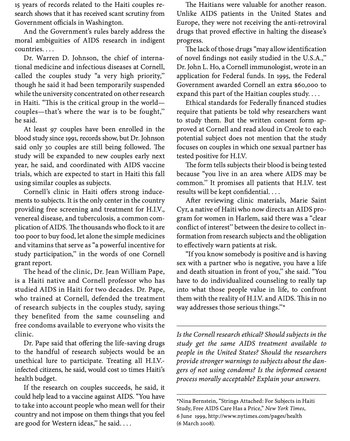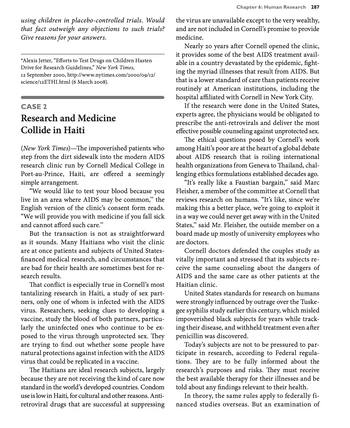
Social Psychology (10th Edition)
10th Edition
ISBN: 9780134641287
Author: Elliot Aronson, Timothy D. Wilson, Robin M. Akert, Samuel R. Sommers
Publisher: Pearson College Div
expand_more
expand_more
format_list_bulleted
Question
Summarize the case study and Defending a moral judgment on the case study : Is Cornell research ethical. the argument should be a valid Modus Ponens argument. After stating and explaining your conclusion and presenting your premises, support each premise using .stating and replying to two objections to your argument.

Transcribed Image Text:15 years of records related to the Haiti couples re-
search shows that it has received scant scrutiny from
Government officials in Washington.
And the Government's rules barely address the
moral ambiguities of AIDS research in indigent
countries....
Dr. Warren D. Johnson, the chief of interna-
tional medicine and infectious diseases at Cornell,
called the couples study "a very high priority,"
though he said it had been temporarily suspended
while the university concentrated on other research
in Haiti. "This is the critical group in the world-
couples-that's where the war is to be fought,"
he said.
At least 97 couples have been enrolled in the
blood study since 1991, records show, but Dr. Johnson
said only 30 couples are still being followed. The
study will be expanded to new couples early next
year, he said, and coordinated with AIDS vaccine
trials, which are expected to start in Haiti this fall
using similar couples as subjects.
Cornell's clinic in Haiti offers strong induce-
ments to subjects. It is the only center in the country
providing free screening and treatment for H.I.V.,
venereal disease, and tuberculosis, a common com-
plication of AIDS. The thousands who flock to it are
too poor to buy food, let alone the simple medicines
and vitamins that serve as "a powerful incentive for
study participation," in the words of one Cornell
grant report.
The head of the clinic, Dr. Jean William Pape,
is a Haiti native and Cornell professor who has
studied AIDS in Haiti for two decades. Dr. Pape,
who trained at Cornell, defended the treatment
of research subjects in the couples study, saying
they benefited from the same counseling and
free condoms available to everyone who visits the
clinic.
Dr. Pape said that offering the life-saving drugs
to the handful of research subjects would be an
unethical lure to participate. Treating all H.I.V.-
infected citizens, he said, would cost 10 times Haiti's
health budget.
If the research on couples succeeds, he said, it
could help lead to a vaccine against AIDS. "You have
to take into account people who mean well for their
country and not impose on them things that you feel
are good for Western ideas," he said....
The Haitians were valuable for another reason.
Unlike AIDS patients in the United States and
Europe, they were not receiving the anti-retroviral
drugs that proved effective in halting the disease's
progress.
The lack of those drugs "may allow identification
of novel findings not easily studied in the U.S.A.,"
Dr. John L. Ho, a Cornell immunologist, wrote in an
application for Federal funds. In 1995, the Federal
Government awarded Cornell an extra $60,000 to
expand this part of the Haitian couples study....
Ethical standards for Federally financed studies
require that patients be told why researchers want
to study them. But the written consent form ap-
proved at Cornell and read aloud in Creole to each
potential subject does not mention that the study
focuses on couples in which one sexual partner has
tested positive for H.I.V.
The form tells subjects their blood is being tested
because "you live in an area where AIDS may be
common." It promises all patients that H.I.V. test
results will be kept confidential....
After reviewing clinic materials, Marie Saint
Cyr, a native of Haiti who now directs an AIDS pro-
gram for women in Harlem, said there was a "clear
conflict of interest" between the desire to collect in-
formation from research subjects and the obligation
to effectively warn patients at risk.
"If you know somebody is positive and is having
sex with a partner who is negative, you have a life
and death situation in front of you," she said. "You
have to do individualized counseling to really tap
into what those people value in life, to confront
them with the reality of H.I.V. and AIDS. This in no
way addresses those serious things."*
Is the Cornell research ethical? Should subjects in the
study get the same AIDS treatment available to
people in the United States? Should the researchers
provide stronger warnings to subjects about the dan-
gers of not using condoms? Is the informed consent
process morally acceptable? Explain your answers.
*Nina Bernstein, "Strings Attached: For Subjects in Haiti
Study, Free AIDS Care Has a Price," New York Times,
6 June 1999, http://www.nytimes.com/pages/health
(6 March 2008).

Transcribed Image Text:using children in placebo-controlled trials. Would
that fact outweigh any objections to such trials?
Give reasons for your answers.
*Alexis Jetter, "Efforts to Test Drugs on Children Hasten
Drive for Research Guidelines," New York Times,
12 September 2000, http://www.nytimes.com/2000/09/12/
science/12 ETHI.html (6 March 2008).
CASE 2
Research and Medicine
Collide in Haiti
(New York Times)-The impoverished patients who
step from the dirt sidewalk into the modern AIDS
research clinic run by Cornell Medical College in
Port-au-Prince, Haiti, are offered a seemingly
simple arrangement.
"We would like to test your blood because you
live in an area where AIDS may be common," the
English version of the clinic's consent form reads.
"We will provide you with medicine if you fall sick
and cannot afford such care."
But the transaction is not as straightforward
as it sounds. Many Haitians who visit the clinic
are at once patients and subjects of United States-
financed medical research, and circumstances that
are bad for their health are sometimes best for re-
search results.
That conflict is especially true in Cornell's most
tantalizing research in Haiti, a study of sex part-
ners, only one of whom is infected with the AIDS
virus. Researchers, seeking clues to developing a
vaccine, study the blood of both partners, particu-
larly the uninfected ones who continue to be ex-
posed to the virus through unprotected sex. They
are trying to find out whether some people have
natural protections against infection with the AIDS
virus that could be replicated in a vaccine.
The Haitians are ideal research subjects, largely
because they are not receiving the kind of care now
standard in the world's developed countries. Condom
use is low in Haiti, for cultural and other reasons. Anti-
retroviral drugs that are successful at suppressing
Chapter 6: Human Research 287
the virus are unavailable except to the very wealthy,
and are not included in Cornell's promise to provide
medicine.
Nearly 20 years after Cornell opened the clinic,
it provides some of the best AIDS treatment avail-
able in a country devastated by the epidemic, fight-
ing the myriad illnesses that result from AIDS. But
that is a lower standard of care than patients receive
routinely at American institutions, including the
hospital affiliated with Cornell in New York City.
If the research were done in the United States,
experts agree, the physicians would be obligated to
prescribe the anti-retrovirals and deliver the most
effective possible counseling against unprotected sex.
The ethical questions posed by Cornell's work
among Haiti's poor are at the heart of a global debate
about AIDS research that is roiling international
health organizations from Geneva to Thailand, chal-
lenging ethics formulations established decades ago.
"It's really like a Faustian bargain," said Marc
Fleisher, a member of the committee at Cornell that
reviews research on humans. "It's like, since we're
making this a better place, we're going to exploit it
in a way we could never get away with in the United
States," said Mr. Fleisher, the outside member on a
board made up mostly of university employees who
are doctors.
Cornell doctors defended the couples study as
vitally important and stressed that its subjects re-
ceive the same counseling about the dangers of
AIDS and the same care as other patients at the
Haitian clinic.
United States standards for research on humans
were strongly influenced by outrage over the Tuske-
gee syphilis study earlier this century, which misled
impoverished black subjects for years while track-
ing their disease, and withheld treatment even after
penicillin was discovered.
Today's subjects are not to be pressured to par-
ticipate in research, according to Federal regula-
tions. They are to be fully informed about the
research's purposes and risks. They must receive
the best available therapy for their illnesses and be
told about any findings relevant to their health.
In theory, the same rules apply to federally fi-
nanced studies overseas. But an examination of
Expert Solution
This question has been solved!
Explore an expertly crafted, step-by-step solution for a thorough understanding of key concepts.
This is a popular solution
Trending nowThis is a popular solution!
Step by stepSolved in 4 steps

Knowledge Booster
Recommended textbooks for you
 Social Psychology (10th Edition)SociologyISBN:9780134641287Author:Elliot Aronson, Timothy D. Wilson, Robin M. Akert, Samuel R. SommersPublisher:Pearson College Div
Social Psychology (10th Edition)SociologyISBN:9780134641287Author:Elliot Aronson, Timothy D. Wilson, Robin M. Akert, Samuel R. SommersPublisher:Pearson College Div Introduction to Sociology (Eleventh Edition)SociologyISBN:9780393639407Author:Deborah Carr, Anthony Giddens, Mitchell Duneier, Richard P. AppelbaumPublisher:W. W. Norton & Company
Introduction to Sociology (Eleventh Edition)SociologyISBN:9780393639407Author:Deborah Carr, Anthony Giddens, Mitchell Duneier, Richard P. AppelbaumPublisher:W. W. Norton & Company The Basics of Social Research (MindTap Course Lis...SociologyISBN:9781305503076Author:Earl R. BabbiePublisher:Cengage Learning
The Basics of Social Research (MindTap Course Lis...SociologyISBN:9781305503076Author:Earl R. BabbiePublisher:Cengage Learning Criminalistics: An Introduction to Forensic Scien...SociologyISBN:9780134477596Author:Saferstein, RichardPublisher:PEARSON
Criminalistics: An Introduction to Forensic Scien...SociologyISBN:9780134477596Author:Saferstein, RichardPublisher:PEARSON Sociology: A Down-to-Earth Approach (13th Edition)SociologyISBN:9780134205571Author:James M. HenslinPublisher:PEARSON
Sociology: A Down-to-Earth Approach (13th Edition)SociologyISBN:9780134205571Author:James M. HenslinPublisher:PEARSON Society: The Basics (14th Edition)SociologyISBN:9780134206325Author:John J. MacionisPublisher:PEARSON
Society: The Basics (14th Edition)SociologyISBN:9780134206325Author:John J. MacionisPublisher:PEARSON

Social Psychology (10th Edition)
Sociology
ISBN:9780134641287
Author:Elliot Aronson, Timothy D. Wilson, Robin M. Akert, Samuel R. Sommers
Publisher:Pearson College Div

Introduction to Sociology (Eleventh Edition)
Sociology
ISBN:9780393639407
Author:Deborah Carr, Anthony Giddens, Mitchell Duneier, Richard P. Appelbaum
Publisher:W. W. Norton & Company

The Basics of Social Research (MindTap Course Lis...
Sociology
ISBN:9781305503076
Author:Earl R. Babbie
Publisher:Cengage Learning

Criminalistics: An Introduction to Forensic Scien...
Sociology
ISBN:9780134477596
Author:Saferstein, Richard
Publisher:PEARSON

Sociology: A Down-to-Earth Approach (13th Edition)
Sociology
ISBN:9780134205571
Author:James M. Henslin
Publisher:PEARSON

Society: The Basics (14th Edition)
Sociology
ISBN:9780134206325
Author:John J. Macionis
Publisher:PEARSON